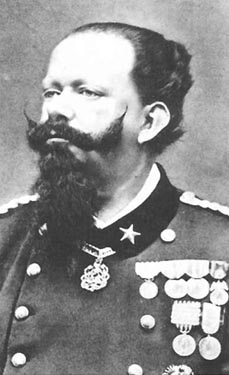 Camillo Bneso di Cavour Prime Minister
Camillo Bneso di Cavour Prime Minister
In Italy, when we speak with persons of our level or in a friendly conversation we use the “tu”, that is we address to the interlocutor in second person and use familiar expressions like “ciao”.
A) - Ciao! E’ un piacere incontrarti!
B) - Ti ringrazio, come stai?
A) – Io bene, e tu?
B) – Adesso ho fretta, scusami… chiamami se vuoi!
A) - Hi! It’s a pleasure to meet you!
B) – Thank you, how are you?
A) – Fine, and you?
B) – I’m sorry but I’m in a hurry… call me, if you like!
When we address to important persons or to strangers we don’t use the “tu” but the “lei”, that is we address to the interlocutor using the third person to the feminine, in this case we don’t use “ciao” but a less familiar expression like “salve” (latin expression used till Roman period).
A) - Salve! E’ un piacere incontrarla!
B) - La ringrazio, come sta?
A) – Io bene, e lei?
B) – Adesso ho fretta, mi scusi… mi chiami se vuole!
In Italy was also used another kind of expression “of regard”, that is the “voi”, today used only with very old persons that used it at their times. Using “voi” we address to the interlocutor using the second person “but to the plural”. In this case the pronoun subject of common use is “lei” (Lei mi ha detto…) but when we address persons of high rank we use “Ella”, with “E” capital. The previous conversation would sound therefore:
A) - Salve! E’ un piacere incontrarvi!
B) - Vi ringrazio, come state?
A) – Io bene, e voi?
B) – Adesso ho fretta, scusatemi… chiamatemi se volete!
In the written formal language the pronouns “of regard” are written with the beginning capital even if they are enclitic. For example:
“Signor Ministro,
ho avuto l’onore di incontrarLa lo sorso anno, quando Ella ha voluto manifestarmi il suo parere…”
“Mr. Minister, I have had the honor to meet you last year, when you liked to manifest your opinion to me…”
The very important persons like the Kings, in the official speeches, or the Popes, used (but now they don’t use any more) the plural instead of the singular, speaking to the first “plural” person (plural of majesty). About majesty plural a phrase remained very famous in Italy: "… nel mentre rispettiamo i trattati, non siamo insensibili al grido di dolore che da tante parti d'Italia si leva verso di noi" (”… meanwhile we respect treaties, we are not insensitive to the pain outcry that is coming towards us from many countries of Italy"). It’s a phrase pronounced from Vittorio Emanuele II, the King of Sardinia on January 10, 1859, this phrase means that, with the support of Napoleon III, the King of Sardinia could have assumed military initiatives against Austria in order to finally create the kingdom of Italy. The speech was received with enthusiasm. The First Minister of the King of Sardinia, the Count (Earl) Camillo Benso di Cavour had sent the text of the speech of the King to the preventive approval of Napoleon III using lower level formulas but the Emperor in person proposed this formula, which remained famous, like the phrase starting the Italian second independence war.




No comments:
Post a Comment